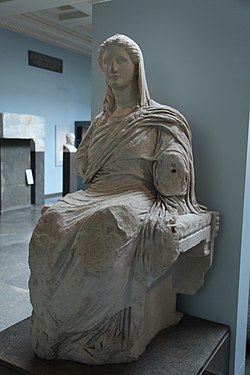Demeter of Knidos
This article needs additional citations for verification. (November 2013) |

The Demeter of Knidos is a life-size, seated ancient Greek statue that was discovered in the port of Knidos, south-west Asia Minor (present-day Turkey). Now part of the British Museum's collection, it is a splendid example of Hellenistic sculpture from around 350BC.[1][2][3]
Description
The statue is made of marble and is approximately 150 centimetres (4 ft 11 in) high. The goddess is seated on a throne and while parts of the sculpture are in excellent condition, the back and arm-rails of the throne, as well as her lower arms and hands, are missing. The head was carved independently from the body and fixed onto the neck. Demeter is depicted in a serene, timeless manner, that unveils her motherly role in the Greek pantheon of gods.
Sanctuary of Demeter
Demeter was the goddess of fertility; she presided over the course of the seasons and the fecundity of the earth. At Knidos she was worshipped together with other deities of the underworld, including Hades and his daughter Persephone. The Sanctuary of Demeter at Knidos was laid out in 350 BC, when the city was reestablished. The sanctuary consisted of a long terrace built into the side of an acropolis, overlooking the city and seascape below. Many votive sculptures were deposited within the sanctuary. Most of these were discovered by excavators in fragments, but the divine statue of Demeter herself remains relatively intact.
Discovery
The Demeter of Knidos was found by the British archaeologist Sir Charles Newton in the mid nineteenth century and was almost immediately sent to London to become part of the British Museum's world-famous Ancient Greek and Roman collection.
References
Further reading
- B. Ashmole, 'Demeter of Cnidus', Journal of Hellenic Studies-1, 71 (1951), pp. 13-28
- C. Bruns-Ozgan, Knidos: A Guide to the Ancient Site, Konya 2004
- G.Bean, Cnidus, Turkey beyond the Maeander, London 1980, chapter 12, pp 111-127
